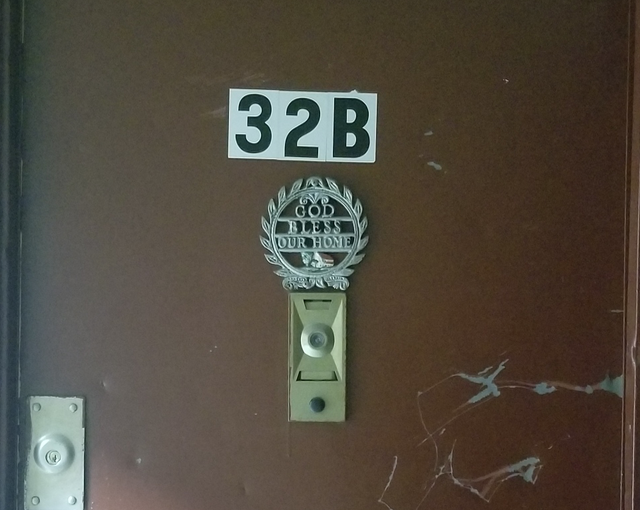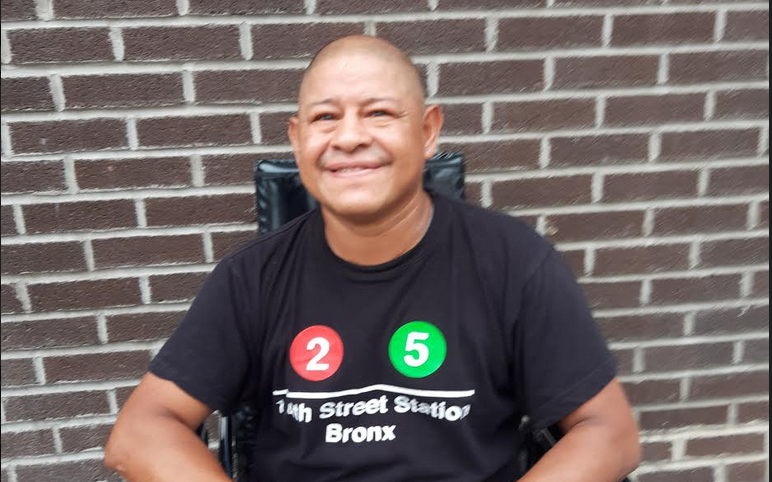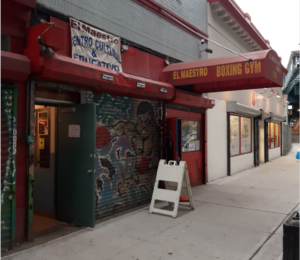Angel DeJesus was certain that the pictures of the black mold growing on the ceiling of his apartment, or the massive holes in the walls would make the Housing Court reverse the eviction that left him and his family out on the street.

But the lack of legal aid resources in the Bronx, coupled with the complicated process of filing a complaint with the Department of Housing Preservation and Development, made suing his landlord a challenging prospect for this Bronx Resident. That’s how DeJesus found himself and his two daughters out on the street, with more than $10,000 to pay in back rent if he wanted to reclaim his family home.
DeJesus’s daughters were the third generation of his family to occupy the Mt. Hope apartment, which first was rented to his immigrant Puerto Rican parents. “Things were really good,” he said. Paying $936 every month for the rent-stabilized three-bedroom apartment had been “a gift from God.”
But over the last two years, the apartment had become increasingly damaged. During the summer a hole appeared in one of the walls, through which DeJesus said rodents would enter the apartment. This resulted in a July 2018 incident where his 16-year-old daughter was hospitalized for a rat bite. Despite this, DeJesus said the landlord had refused to make repairs.
Then in October, hot water began to pour continuously from the faucets and shower, DeJesus said. The apartment became extremely hot and humid. “If you wanted to go to the sauna, I’d tell you just come to my place,” DeJesus joked bitterly.
The moisture, he said, began to warp and splinter the walls and doorframes of the apartment. It caused the black mold to grow across the ceiling, before the super finally turned off the hot water, two months after it first began to flow.
DeJesus was incensed. He’d heard that withholding rent was a legally protected response to a landlord failing to comply with the terms of the lease, so in October 2018 he decided to stop paying until the landlord completed all of the repairs.
“There’s a very specific protocol for withholding rent,” according to Jessica Hurd, Assistant Director of tenant advocacy group Housing Court Answers.
Tenants in this situation should begin by contacting building inspectors for the city, Hurd said, and make copies of any letters sent to their landlord. Above all, Hurd said tenants should secure the help of a lawyer who can help navigate the process and potentially even hold the unpaid rent money in a trust.
But DeJesus’s apartment lies outside the four Bronx zip codes whose residents are eligible for free legal counsel, and Bronx Legal Aid’s Housing Court office can only take seven cases a day. This is despite the fact that the eviction rate for the Bronx was more than double that of any other borough, according to data from the New York City Council website. DeJesus would likely have had to retain his own lawyer, which he said was challenging: his income as an occupational therapist’s assistant places him below the poverty line.
So DeJesus, who said he never completed high school, was left to navigate the system alone. Appearing in court alongside his 22-year-old daughter Jailene DeJesus on Sept 18, DeJesus was certain that he’d followed the correct steps to document complaints against his landlord.
He’d been shocked when just two days before, he found the locks on his apartment changed, and his family out on the street. He said he never received a letter of eviction, though the attorney for his landlord said that one was mailed out.
Clutching a manila folder filled with photos of what he says is mold creeping across the ceiling of his bathroom, a hole in one of the apartment’s walls, and an emergency room discharge paper showing that his daughter was treated for a rodent bite – DeJesus appeared before a Housing Court judge. But he was informed that any violations committed by his landlord were irrelevant now that he was no longer in possession of the apartment.
In order to continue legal proceedings against his landlord for the damages to the apartment, DeJesus was told he’d have to repay almost the full year’s worth of unpaid rent and legal fees. “We’re going to the bank now,” said DeJesus as he and his daughter Jailene left court that afternoon. “We are going to go get the money, so we can get our house back.”
Mark Cohen, the attorney for DeJesus’s landlord, said he wanted to work things out with the family, and even met with him before court that morning.
“I feel for him, I really do. But he didn’t pay his rent,” Cohen said.
“His daughter Jailene is about to start school, and now she’s going to be out on the street, right at the start of the semester. She doesn’t need that.” said Cohen.
Cohen said he was unaware of the damages to the apartment alleged by DeJesus. However, multiple legal documents known as Housing Part (HP) stipulations, written on the documents with Cohen’s law firm’s letterhead and signature on them, specifically call for many of the same repairs that DeJesus alleged – including damaged door-frames caused by “heat from hot water” – in exchange for DeJesus making payments on the rent owed. Several possible entry dates for workmen to complete the repairs were listed for July 2019, but DeJesus says the workmen never showed up, so he kept withholding rent. Cohen did not respond to requests for comment regarding the signed stipulations ordering repairs to DeJesus’s apartment
“Unrepresented tenants get into trouble because they don’t know how the system works,” said tenant’s rights attorney Sam Himmelstein. “Housing court is a scary experience, and tenants just want to get out of there as quickly as possible. They have a seasoned professional; the landlord or their landlord’s lawyer, sitting across from them, who knows the system far better than they do.”
Tenants end up signing settlement agreements that they don’t understand, Himmelstein said, often featuring legal wording that favors the landlord. For example, a legally binding agreement known as a Final Judgement clause is often mistaken by tenants to be an agreement that the tenant will cease withholding rent in exchange for the landlord making repairs.
“The two clauses are actually separate,” said Himmelstein. “The tenant will think that the wording of the agreement means that if the landlord doesn’t do the repairs as agreed, they don’t have to pay, but the tenant still gets held responsible for paying regardless of if the landlord makes the repair or not,” said Himmelstein.
Pelham Bay resident and father of three Joshio Sereno, 37, said that he was three months behind on rent when he showed up for a Resolutions Court appearance on September 18th. “The landlord keeps saying that I have to sign a payment plan for the rent I owe, which says I’m going to pay by the end of the month,” said Sereno.
“I don’t understand how I can sign that when I don’t have the money right now,” he said. “I’m trying to tell the judge that I can’t sign a lie, but they won’t take no for an answer.” Sereno lost his job as a doorman after refusing to work a 16-hour double shift because he had to pick up his children from school, he said.
Housing Court had been confusing for Sereno, who like DeJesus, lived outside of the Bronx zip codes where tenants in eviction proceedings are provided free legal counsel. “I just don’t want to sign anything I don’t understand,” said Sereno.
New York City’s Universal Access to Counsel legislation offers a promising answer to this issue, guaranteeing free legal representation in eviction proceedings to all NYC residents under a certain income by the year 2022. However, Jessica Hurd of Housing Court Answers said it’s not a fix-all.
“Affordability is going to still be a huge issue. Rents that have been increased over time are going to stay high, and landlords will always find a way around things,” Hurd said.
Twelve days after his Sept 18th court appearance, Cohen said that DeJesus still hadn’t paid the rent owed in order to reclaim his apartment. The apartment, neighbors say, is now empty.
This article has been updated to reflect that Jessica Hurd of Housing Court Answers did not comment directly on Angel DeJesus’s case but was speaking broadly about the best practices and dangers of withholding rent.





